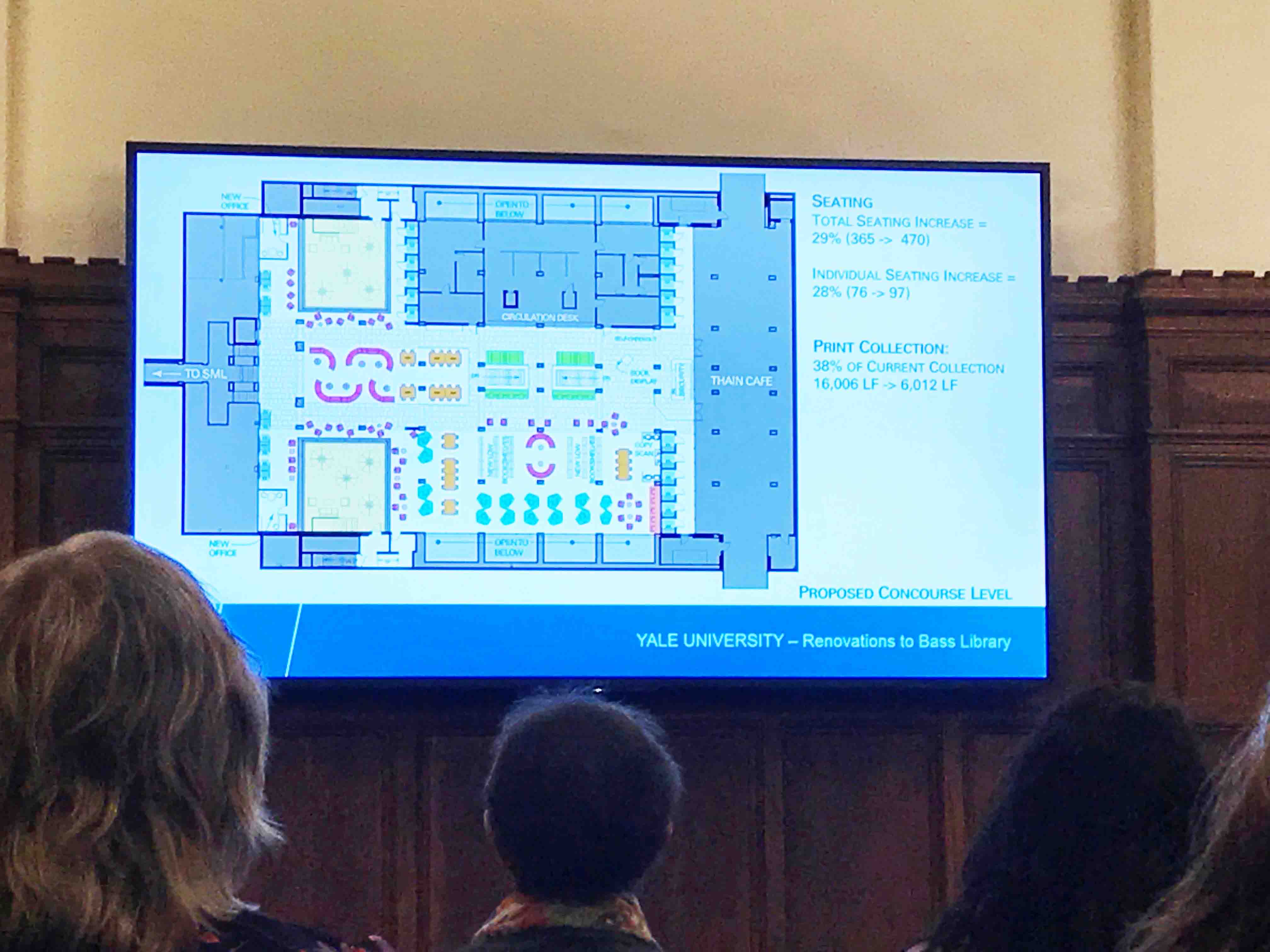
Forget “Imagine the Schwarzman Center.” How about “Reimagine Bass Library?”
Upon viewing plans of a reimagined Bass Library — which will experience a two-thirds reduction in its number of books to open up more space for students — professors and students expressed their frustrations about the displaced literature during an unveiling of the proposal at Sterling Memorial Lecture Hall on Wednesday.
Since its initial construction in 2007, Bass Library has been a highly popular hub for students rushing to complete their papers, problem sets and readings. But with the advent of the new colleges and the resulting increase in the size of the student body, popular study spaces have become overpopulated, with many students struggling to find seats in Bass, according to Sarah Tudesco, assessment librarian and the chair of the renovation planning committee. As a result, University Librarian Susan Gibbons has been working with an advisory group consisting of students and faculty to rethink the design of the library to accommodate the needs of the larger student body. Martha Werenfels, a representative from Providence-based DBVW Architects, presented a plan for reconstruction beginning May 2019 to an audience of around 50 students, faculty and librarians.
The reconstructed library will increase seating by 25 percent by reducing a majority of the stacks where books are shelved, according to Werenfels. Materials that are removed will be relocated to the stacks in Sterling Memorial Library, according to Jae Rossman, the director of the Department of Area Studies and Humanities Research Support at Yale University Library.
“What we heard from the study where we interviewed students is that students want to be alone and have some ability to concentrate but also [be] together while doing the same thing,” Werenfels told her audience. “A challenge where they have personal space but can see others doing the same thing has been our goal.”
The reimagined Bass Library will also generate more natural light and expose the vaulted ceiling to make students feel like they are not underground, according to Werenfels. To achieve this effect, the construction will involve shorter stacks, and pods on the upper level will be relocated to the lower level to create more room for natural light from the courtyard. The courtyard will be made “more inviting” for study breaks, with new furniture and easier access.
One of the prominent changes that will free up space for more seating is the relocation of Course Reserves — primary and secondary texts from students’ courses available for checkout — to an enclosed space where students must request to check them out. When the floor was opened for questions, many professors expressed their outrage with such a system.
“You are removing what I and my students value so highly — to go look among books on reserve,” professor of English Leslie Brisman said to the audience. “If we put them behind the desks, they can’t look and choose among them. You’re replacing that intellectual opportunity with seating.”
Many other professors expressed similar sentiments.
History professor Jennifer Klein questioned why the study space had to be cleared in Bass Library while available space in the new colleges or in the Schwarzman Center is not utilized.
Professor of English Jill Campbell GRD ’88 said that the reconstruction plans were not made on an educational basis. Campbell added that she felt discouraged that library staff did not partner with faculty in deciding to adjust the collections in Bass library.
But faculty were not the only audience members upset with the decision.
“My main concern about the direction of the project is it is missing the fundamental nature of what it is to be a student,” Leland Stange ’19, a staff columnist for the news, announced at the presentation. “The unique experience of browsing books in Bass — seeing a collection that does not just span a few of the primary works but also secondary works, and those that are deemed helpful for a certain project.”
In response to concerns from student and faculty, Gibbons said undergraduate students are drawn to Bass, so the University Library administrators are attempting to create more space at places that students already populate. Gibbons added that if no changes are made, Bass will become a less conducive study space due to overpopulation, which might just lead to students abandoning it altogether.
Thain Cafe will remain untouched by the renovation plans.
Jever Mariwala | jever.mariwala@yale.edu .







